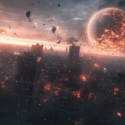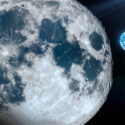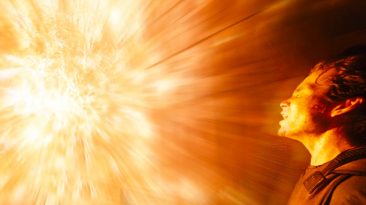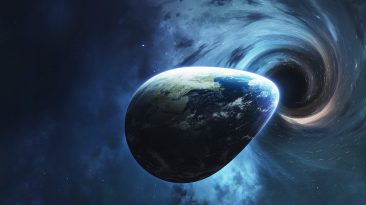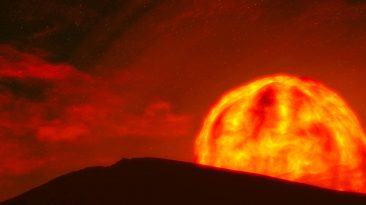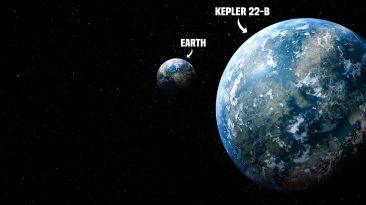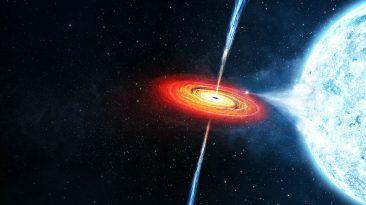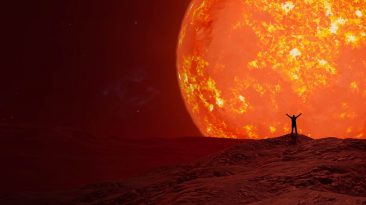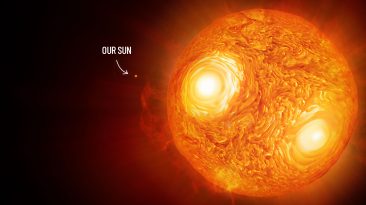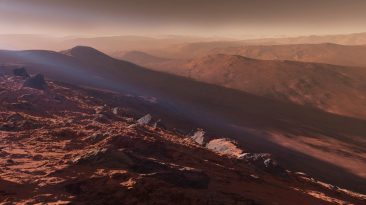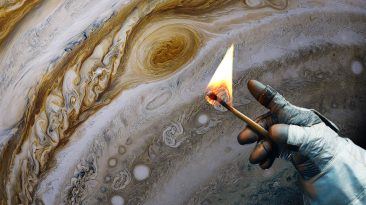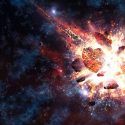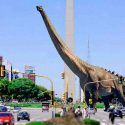Imagine if one day you looked up into the night sky, and saw Mars or Saturn where the Moon was supposed to be. That would sure turn our Earth into an alien world. And not just because of the new view.
How would replacing the Moon change the Earth’s orbit? What planet could we safely replace our Moon with? And what planet would be the most disastrous?
We can thank the Moon for predictable weather, ocean currents and the circulation of important nutrients. The Moon also helps stabilize the Earth’s tilt. Take away the Moon, and the Earth would go wobbling all over the place. And it would cause what I can only describe as climate change on steroids.
But we wouldn’t just let the Moon take a day off. We would find it a replacement from another part of our Solar System. So what would happen if we swapped our Moon with a planet that is 41 times its size?
Before we get to that dramatic part, let’s talk about Pluto. Pluto wouldn’t look much different than our current Moon. It would be smaller though, and this wouldn’t be good for Earth.
That’s because Pluto’s gravitational pull would be weaker than that of the Moon. Earth would begin wobbling all over the place. And it would result in dramatic climate change. All sorts of natural disasters ruining your day. The Moon’s gravitational pull is responsible for our daily ocean tides. Because Pluto is smaller than our Moon, our ocean tides would become weaker. This would devastate important ecosystems.
OK, where were we? Ah, Pluto covering for the Moon. Well, how about a planet that is slightly larger than our Moon?
Mercury would look exactly like our Moon with its dark gray surface and asteroid craters. And it’s only 1.5 times the size, so its impact on our tidal systems and climate wouldn’t be disastrous.
Out of all the planets in our Solar System, Mercury would be the safest one to replace our Moon. But I can’t say that about Mars. Having the red planet in our night sky would be quite a sight. All the iron oxide on its surface would glow red.
No more white moonlight shining through your window at night. Instead, everything would be bathed in an eerie red. Mars’ stronger gravitational pull would make tsunamis smaller. But it would make normal waves massive. And because Mars would create stronger tidal forces, Earth’s rotation would slow down. The days on Earth would become longer. I hope we’d still keep 40-hour work week. Because a 16-hour workday doesn’t sound that great.
Moving on. With Venus in our night sky, we might never experience darkness. Venus is the brightest planet in our Solar System. It would reflect 60% more light than the Moon.
And because it’s 3.5 times the size of the Moon, it would force the Earth into a binary system. Earth and Venus would rotate each other. It would be beautiful and disastrous. Simulations of a binary system usually end with planets colliding or merging.
Neptune and Uranus are both ice giants and are similar in size. A huge portion of our sky would be taken up with a blue-green planet. Only Uranus would also stink horribly. No wonder this fart-smelling planet got such a name.
Since both Uranus and Neptune are 14 to 15 times the size of the Moon, their impact on Earth’s rotation and tidal systems would be drastic. Beach houses would have to be built up on cliffs, far from the reach of enormous waves.
Now, seeing Saturn up in the night sky has to be my favorite. Its pale yellow color and ring system would be stunning. But there would be some complications. Because Saturn is so large, the Earth would quickly become its moon.
And if Earth orbited around Saturn, it simply wouldn’t be the Earth we know today. Finally, moving on to the big guy, Jupiter. At 41 times the size of the Moon, you wouldn’t even be able to see the North and South poles of the gas giant.
Similar to the deal with Saturn, Earth would become Jupiter’s moon. Only it would get worse. Because Jupiter is so massive, the side of Earth that’s closest to Jupiter would experience a stronger gravitational pull than the opposite side. This would distort the shape of the Earth. All this pulling apart would create frequent volcanic eruptions and violent earthquakes. Jupiter’s gravitational pull would tear the Earth apart. So enjoy the view while it lasts.
Sources
- “How does the Moon affect the Earth?” iop.org
- “How far is Mercury from Earth?”. 2021. Cool Cosmos.
- “What Color Is Mercury? – Universe Today”. 2008. Universe Today.
- “Jupiter Fact Sheet”. 2021. nssdc.gsfc.nasa.gov.
- “Moon Fact Sheet”. 2021. nssdc.gsfc.nasa.gov.
- “Venus Fact Sheet”. 2021. nssdc.gsfc.nasa.gov.
- “Why is Venus so bright? | Earthsky.Org”. 2021. earthsky.org.





